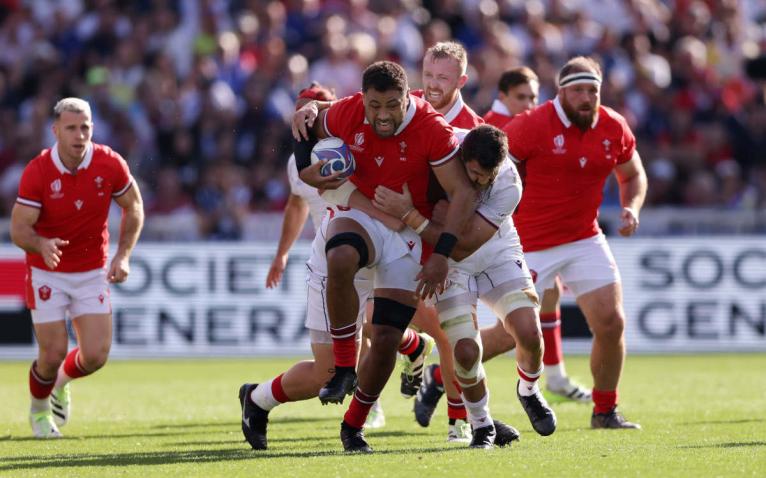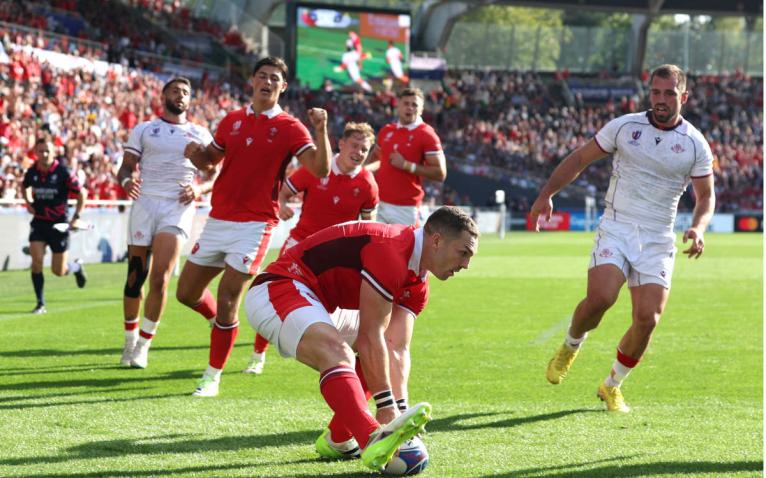When assessing Wales’s progress into the last eight of the Rugby World Cup, it’s easy to scoff. Accusations of an easy Pool – something totally out of their control – limited points for aesthetic style and not being one of the darlings of the World Cup; read Ireland, France or even the muscular Springboks, have cast Wales as bit part players in the eyes of the neutral for this tournament. Yet if you have to look at where Wales came from, all but the harshest of judges must accede that Warren Gatland has done a bloody fine job in seeing Wales, not only through to the group stages, but as group winners in a Pool featuring Australia, Fiji and Georgia. Many learned voices had predicted Wales would face a swift return from whence they came. Not so.
How their dissenters laughed when Alun Wyn Jones, Justin Tipuric and Rhys Webb stood down before the tournament. ‘Will Wales have any players left?’ the wags chimed.
Don’t forget, in the last 18 months, Wales had lost to Italy at home for the first time, Los Lelos (Georgia) for the first time and finished a lowly fifth in the Six Nations. Worse still, their union was embroiled in ugly sexism and misogyny headlines played out in public and the players were on the verge of striking with the countries domestic relationships riven by mistrust, claim and counterclaim. With players unable to negotiate contracts and a glut of players made redundant, a weary Ken Owens admitted that Wales had become, ‘the laughing stock of world rugby’.
The critics had long smelt blood and there were populist newspaper articles claiming that Wales was no longer a rugby nation, that it had turned its back on the broken WRU and become a football nation, bound by the patriotic Yma o Hyd, sung mellifluously by Dafydd Iwan at Wales football matches, as Robert Pages’ men reached the World Cup for the first time since 1958.

Those vocal detractors are noticeably absent right now with the football team going through its own post-Bale transition period. With its rugby team sitting pretty, thousands of fans are booking flights, trains and boats down to the Cote d’Azur this weekend, hoping to continue their unlikely journey. To witness the bonhomie, camaraderie and togetherness of fans in Bordeaux, Nice, Lyon and Nantes is living proof that rugby can still stir passion and national hwyl in abundance. That’s what success looks like. The fair-weather fan will come and go, but Welsh rugby’s core support will stick with them through thick and thin.
Wales are patently not the finished article – as we saw against Georgia – yet nor are they promising to be. Gatland has made more advances with Wales than Eddie Jones has with a callow Australia, or Steve Borthwick has with England, where they are playing rugby that only a mother could love. Both appointments were made within weeks of the Kiwi. Indeed, Gatland has been true to his word. He promised the media in the bowels of the Principality Stadium back in March that, contrary to all the evidence, Wales would surprise a few people at the World Cup. They are becoming harder to beat. Less porous. Less fretful. They are more adventurous and their sense of identity is evident. They have scored 17 tries, made a ridiculous 253 tackles against Fiji and beat Australia by a record score. They won’t get the credit from further afield, but it is warranted.
In Nantes, Wales’ brittle confidence was rocked by Gareth Anscombe’s late, late withdrawal. An accomplished game manager, the pain was palpable on his face when he felt a tightening in his groin.
Even as late as August, when Wales were being derided as out of their depth against South Africa, few would have believed they had a shot at a World Cup semi-final. So many glanced at the 52-16 score and forgot to look at the line-up, which largely included squad members superfluous to Gatland’s chosen 33. Gatland knew he’d seen enough against England to suggest sunnier days lay ahead.
In Nantes, Wales’ brittle confidence was rocked by Gareth Anscombe’s late, late withdrawal. An accomplished game manager, the pain was palpable on his face when he felt a tightening in his groin and for 22-year-old Sam Costelow, it was a baptism of fire, against a Georgian side that made a few Welsh hearts flutter in the third quarter. Wales needed leadership and a steady hand at the tiller and it was too much to expect of ‘Costy’, who is very much learning on the job. The rocky period coincided with Dewi Lake’s departure, after an accomplished outing where, importantly, he didn’t miss a single lineout throw.

Wales’ quicksilver saviour was Louis Rees-Zammit. There have been complaints that Rees-Zammit doesn’t get enough-involvements but in the blazing sun of Nantes, the Gloucester-wing was blazing a trail in space as he scorched the turf. Wales must involve their match-winner against Argentina to improve their chances of advancing to the semi-finals.
One player who has quietly gone about his business is George North. At 31, he no longer covets the limelight, happy enough for others to shine, but his slick handling – never seen as an asset of his game – put Rees-Zammit away twice, when under pressure from Georgian line-speed and Rees-Zammit repaid the favour in the 79th minute, when North skipped over for his 49th Test try (included two tries for the Lions), to put him joint seventh in the all-time try-scorers, with ‘Deadly’ Doug Howlett. To move from the wing to 13, in your latter playing years is no easy task, but North has done it with aplomb and in many ways he is taken for granted by the Welsh public, but his worth will be seen in time. Mark my words.
Tommy Reffell is a mix of Martyn Williams and Sam Warburton and will not let Wales down, if called upon.
Against Argentina, Wales have injury concerns, which is unsurprising after four full-blooded Tests. None will be more keenly felt that Taulupe Faletau. A broken-arm, incurred late on in the game is a sad final World Cup bow for this icon of the Welsh game. This is the Russian roulette coaches have to play. Faletau hadn’t played since April and Gatland felt he improved with game-time. His input during the Pool stages was considerable but if fans look around there aren’t many sides left who are not counting the cost of a highly-attritional game. It’s easy to say Gatland should have pulled him off but we’re all winners in the hindsight Olympics.
Wales have called up Kieran Hardy, feeling that they have enough cover in the backrow and Aaron Wainwright is a capable deputy at No 8. In Tommy Reffell, Wales have a breakdown specialist who could eke penalties out of the muscle brothers, Marcos Kremer and Pablo Matera, who is a doubt after picking up a knock against Japan. Reffell’s rugby intelligence shone against Georgia, charging down a kick, winning three turnovers, making 19 tackles and acting as a linkman between backs and forwards. He is a mix of Martyn Williams and Sam Warburton and will not let Wales down, if called upon. The oversized backrow of Los Pumas may call for the improving Christ Tshiunza to be drafted in to the 23-man squad for his 6ft 6in, 18st heft.

One upside for Wales is that they rested Jac Morgan, Adam Beard, Josh Adams and Ryan Elias, and managed to keep Dan Biggar off the field, while he recovers from his pectoral injury. The folly of 13 changes against Portugal was heeded as an acknowledgement of Georgia’s strength.
Wales maybe acknowledged in the world rankings as the No 5 ranked side early this week. A matter of months ago they were ranked as No 10. Fortuitous draw or not, if Gatland’s men can navigate a nervy quarter-final and stay alive in Paris, they will have exceeded expectations. For a country of 3.1 million, with modest playing resources, a third World Cup semi-final in four attempts will mark the man from Waikato out as one of the premier coaches of the modern era.
Wales will keep bobbing and weaving and punching above their weight. The journey continues.
Wales’ possible 23-man squad for quarter-final Marseille;
Liam Williams, Louis Rees-Zammit, George North, Nick Tompkins, Josh Adams, Dan Biggar, Gareth Davies; Aaron Wainwright, Tommy Reffell, Jac Morgan, Adam Beard, Will Rowlands, Tomas Francis, Ryan Elias, Gareth Thomas
Bench: Henry Thomas, Dewi Lake, Corey Domachowski, Dafydd Jenkins, Christ Tshiunza, Tomos Williams, Sam Costelow, Rio Dyer


But the English media won't!